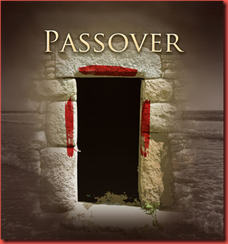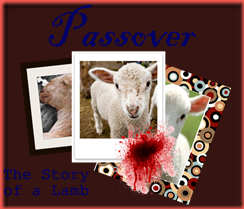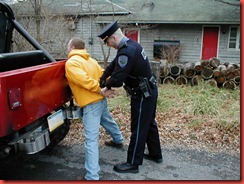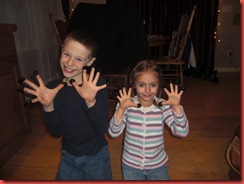 A question has been asked of me a few times recently and it’s a topic that I think warrants fair discussion. The question is, “Why would a Christian want to celebrate Passover?” Especially where we live, we’re surrounded by a decidedly “Christian” culture. Our society celebrates Christmas & Easter, we go to church on Sunday, we work hard, play hard, and we generally try to live lives as good people. So why rock the boat? It’s a fair question.
A question has been asked of me a few times recently and it’s a topic that I think warrants fair discussion. The question is, “Why would a Christian want to celebrate Passover?” Especially where we live, we’re surrounded by a decidedly “Christian” culture. Our society celebrates Christmas & Easter, we go to church on Sunday, we work hard, play hard, and we generally try to live lives as good people. So why rock the boat? It’s a fair question.
First, I want to share a true story with you. Growing up, my grandparents had some friends who were married. This couple, although married, did not live together. They loved each other, went places as a married couple, and they were committed to each other in a legal marriage. But they lived in separate houses. As a pre-teen, I thought this was really strange, so when visiting my grandparents one time, I asked the wife why this was. She explained to me that although she loves her husband, they had a very hard time getting along peacefully when they lived together. They didn’t want to divorce, so they decided to live in separate houses. Interesting. And it worked for them, I suppose. However, now that I’m an adult and am married, I think I would find that kind of marriage very unfulfilling. There is so much more to a marriage that you miss out on if you don’t live in the same home. Who would look forward to you arriving home each day? Who would you share your quiet, spare moments with just snuggling on the couch? Who would you steal kisses and hugs from, just because you want to? So much of the intimacy would be lost.
Now, onto another analogy. When we make new friends, we often invite them into our homes for a meal so we can get to know them better. Then, usually, they’ll invite us to their home for dinner and in their home, we get to know them a little more when we see what their life is about by how they live. Now imagine staying with them for an extended period, weeks or months or a year, maybe. Being welcomed into their home – their daily activities – is far more intimate than just spending the dinner hour with them. You get to see them as a person operating in their daily lives. The longer you spend with them in their space, the better you get to know them and what they are about as a person.
This is the relationship I want to have with Jesus. For my own benefit, I want to know who He is in His life, His time, and His culture – His home. When you get to know a person in this intimate capacity, it would be very difficult to walk away without somehow being deeply touched by their life. I don’t want Him to just be my dinner guest. I am the depraved one – I don’t have much to offer for His benefit in my home other than maybe a tasty meal, but oh, the benefits I can reap from dwelling with Him in His! I think this is why the Christian walk is likened unto a marriage. When we “dwell” with Him in that way, His life will touch ours in ways we could never imagine.
This is where celebrating Passover comes in. It’s not just that one thing, though. We can read about His teachings in black and white print and it’s like a black and white television show. It’s a great read…a great show! However, when we learn about His entire culture – what the people of His time and in His culture thought like, how they lived, how they conducted their lives, the black and white show comes alive into vibrant color, in 3-D, High-Def! I’ll never be able to watch the black and white television with the same satisfaction again.
So where do you learn about this culture He was part of? Well, we know He was Jewish so we can start with that. However, a quick history study will show you that Jewish culture today is quite a bit different from the Jewish culture of Jesus’ day. This we have to learn through a study of history and learning about what they’ve found through archaeology. Thankfully, the Jewish people are excellent historians and they’ve kept very detailed records for us to learn from. It’s also helpful to learn the history of all that has changed since Jesus’ time so we know how we got from where He was to where we are today. Only then can we effectively bridge the gap between now and then.
A dear friend warned me about getting caught up in a culture basically just because it’s something to be part of. She’s right, there are very real dangers in that. It’s dangerous to become part of anything we don’t fully understand, so we must educate ourselves and understand it as much as possible. If I want to join myself to Jesus, I’ve got to understand Him as much as possible. It is just as dangerous to participate in a Jewish culture we don’t understand as it is to participate in a Christian culture we don’t fully understand. I submit to you, though, that I feel safe with doing anything Jesus would have done because He’s the ONE man who did do things right!
After learning about why we do some of the things we do in our Christian culture, It really made me take a step back and ask myself if I was okay with doing those things that are nowhere in the Bible. And history teaches us that many, many believers in Jesus have had the same struggle. I guess the best thing to do is ask ourselves, “What would Jesus have done in our situation?” That is why it is SO crucial to understand what He did do in similar situations in His own culture, as well as what He taught the apostles to do.
 So, why do I celebrate Passover?
So, why do I celebrate Passover?
My easy answer is, “Because Jesus did.” For a more legitimate answer, though, did Jesus just celebrate the Passover (and the other Biblical feasts) simply because it was part of His culture, or was it more than that?
Well, we know that in the Old Testament, God instructed all of His people, Israelite and Gentile alike, to celebrate these feasts. He gave the instructions to do so at Mount Sinai. We know from Exodus 12:37-38 that the children of Israel were present at the mountain that day as well as a mixed multitude of people that also left Egypt with the Israelites…people who also wanted to be part of God’s children. The ten commandments, instructions for the feasts, and all the other instructions were given to Israel and Gentiles together. We can learn from a quick study of the Hebrew language that when Moses recorded the “Torah” (Genesis – Deuteronomy) that “Torah” means “instruction.” This section of the Bible is for “instruction” for God’s people on how to live our lives. Simple enough. We’re free to carry out those instructions with whatever traditions we choose to create, however the instructions themselves are concrete and are for our benefit.
References in the rest of the Bible to the “instruction” section of the Bible (the Torah) are often translated “law.” That is also a fair translation because laws are instructions. In civil society, we make laws to keep us safe. One example is a speed limit. We are, in fact, free to drive over the speed limit, but in accordance with the law, we can be penalized for doing so because it puts ourselves and others at higher risk. The worst consequence would be having a crash happen at high speeds that might injure us or take our lives. Civil laws are given for our instruction and benefit and we’re also subject to consequences if we break them -- the same as the laws or instructions of Torah.
Some feel that these “laws” were “fulfilled” when Jesus died on the cross. Let’s read His words about this topic in Matthew 5:17 and following,
“Think not that I am come to destroy the law, or the prophets: I am not come to destroy, but to fulfill. For verily I say unto you, till heaven and earth pass, one jot or one tittle shall in no wise pass from the law, till all be fulfilled. Whosoever therefore shall break one of these least commandments, and shall teach men so, he shall be called the least in the kingdom of heaven: but whosoever shall do and teach them, the same shall be called great in the kingdom of heaven.”
If we dig into these words of Jesus a little deeper, we find that “fulfill” in verse 17 means “to complete or to fully preach.” After these three verses, Jesus goes on to explain deeper meanings of obeying the commandments…He’s teaching that NOT ONLY is it important to obey or do them, but it is just as important to have the right attitude about things, too. He’s more fully preaching how to obey! Having the right attitude will keep us from falling into harmful sin. Deitrich Bonhoeffer (a prominent Christian theologian during the time of WWII), in his book The Cost of Discipleship, explains Jesus’ words regarding the rule of law. He writes:
The law Jesus refers to is the law of the Old Covenant, not a new law, but the same law that He quoted ot the rich young man and the lawyer when they wanted to know the revealed will of God. It becomes a new law only because it is Christ who binds his followers to it. For Christians, therefore, the law is not a ‘better law’ than that of the Parisees, but one and same; every letter of it, every jot and tittle, must remain in force and be observed until th eend of the world. Jesus has in fact nothing to add to the commandments of God, except this, that He keeps them. He fulfills the law, and He tells us so himself, therefore it must be true. He fulfills the law down to the last iota.”
Other places in the New Testament teach these same concepts, so we know the apostles were also teaching these things. 1 John 3:4 gives us a definition of sin, “Whosoever commits sin transgresses also the law: for sin is the transgression of the law.” The only Biblical law recorded at the time this verse was written was that of the Old Testament. When reading any of Paul’s writings, we have to be extremely careful to understand the context of the things he was saying because he was so well educated that he often wrote right over people’s heads because he often assumes we understand the intricacies of the Torah and he was often addressing a very particular situation in his congregations. To properly understand anything Paul wrote, we must keep in mind that Paul was a “Pharisee of Pharisees” (Acts 23:6), which means that He was an ardent law-keeper. In Acts, he was being put on trial for possibly teaching people against keeping the Torah (law), but was found to be innocent. If he had been found guilty, the religious leaders would have put him to death at that time for being a heretic. We consistently see the apostles and Jesus keeping the law both before and after Jesus’ death. They were keeping the feasts (Pentecost, when the Spirit fell on the believers, is even a feast from the Torah!) and even making sacrifices up until the time of the destruction of the Temple.
So, we know that Jesus, as well as the apostles, kept Passover because they were following God’s instruction. We know that Jesus often went against Jewish traditions such as not healing on the Sabbath day, but we never see Him breaking the instructions/laws of the written Torah. In fact, if He ever did break a Torah law, that would have made Him guilty of sinning according to 1 John 3:4 and then He could NOT have been the sinless sacrifice! Well then, since He kept all the laws perfectly, doesn’t that release us from having to obey? No. Going back to Matt. 5:19, He teaches us we should not break the commandments or teach others to do so. We see him celebrating the Passover with his disciples and He even explained to them during the Passover seder (meal), “This do in rememberance of me.” (Luke 22:19)
So, what are the benefits to the feast days? Each of them teaches us about some aspect of God’s redemption plan. Some teach us about Jesus being our High Priest so that we can approach God, some teach us about Jesus’ sacrifice for our sins, some teaching us about God’s desire to dwell with us, among many other things. They all have incredible meaning for Jewish people who believe in God, but they are even more meaningful if you believe in Jesus, too! We know that God has already carried out parts of His redemption plan through Jesus, so we have more to celebrate!
If we choose not to celebrate these feasts, admittedly, the consequences probably aren’t immediate. However, over the course of generations, if it weren’t for the faithfulness of the Jewish people, we might have lost much of this knowledge of God’s redemption plan. I don’t want to risk that happening any further in my family, so I will teach my children these things. The feast days are God’s way of ensuring that we and our children KNOW the promises God has made to them. And when we physically participate in activities taught in the Bible, it goes from being a black and white lesson on paper to a 3D, High-Def, in-living-color movie! So much better! And the lessons we learn through them are invaluable for our lives as God’s people. They give us peace and hope for an even brighter future!

Click the photo for a TV program that discusses this same topic:
 Not only is it such a sweet time to spend together, it's a great opportunity to share ideas and things that I want to teach my children. I love choosing stories that will teach them a great moral lesson or something that has really had an impact on my own life. I also love experiencing different things with them through books...things we might never get to experience together otherwise. Oftentimes these stories generate wonderful discussions about everything under the sun. They give us an opportunity to share things with each other that we might never think to bring up otherwise. And sometimes they're just plain fun and silly so we can giggle together!
Not only is it such a sweet time to spend together, it's a great opportunity to share ideas and things that I want to teach my children. I love choosing stories that will teach them a great moral lesson or something that has really had an impact on my own life. I also love experiencing different things with them through books...things we might never get to experience together otherwise. Oftentimes these stories generate wonderful discussions about everything under the sun. They give us an opportunity to share things with each other that we might never think to bring up otherwise. And sometimes they're just plain fun and silly so we can giggle together!







 So, why do I celebrate Passover?
So, why do I celebrate Passover?


